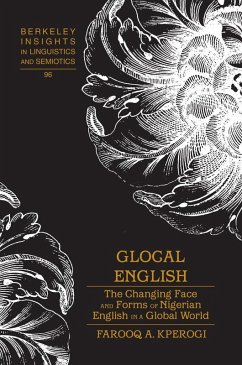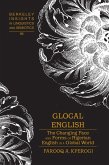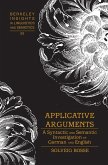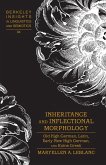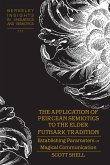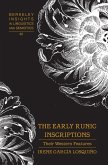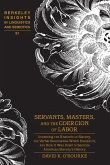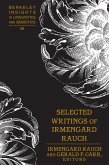Glocal English compares the usage patterns and stylistic conventions of the world's two dominant native varieties of English (British and American English) with Nigerian English, which ranks as the English world's fastest-growing non-native variety courtesy of the unrelenting ubiquity of the Nigerian (English-language) movie industry in Africa and the Black Atlantic Diaspora. Using contemporary examples from the mass media and the author's rich experiential data, the book isolates the peculiar structural, grammatical, and stylistic characteristics of Nigerian English and shows its similarities as well as its often humorous differences with British and American English. Although Nigerian English forms the backdrop of the book, it will benefit teachers of English as a second or foreign language across the world. Similarly, because it presents complex grammatical concepts in a lucid, personal narrative style, it is useful both to a general and a specialist audience, including people who study anthropology and globalization. The true-life experiential encounters that the book uses to instantiate the differences and similarities between Nigerian English and native varieties of English will make it valuable as an empirical data mine for disciplines that investigate the movement and diffusion of linguistic codes across the bounds of nations and states in the age of globalization.
Dieser Download kann aus rechtlichen Gründen nur mit Rechnungsadresse in A, B, BG, CY, CZ, D, DK, EW, E, FIN, F, GR, HR, H, IRL, I, LT, L, LR, M, NL, PL, P, R, S, SLO, SK ausgeliefert werden.
«What is wonderful about Professor Kperogi's book is its erudition, its no-nonsense approach, and its familiar language. In other words, the reader is in for a treat.... [F]or many of us who thought we knew what 'English' meant, reading this book will teach us not only how language works and how English has changed, but about its speakers in Nigeria, their world, and the world of how they talk to each other. The British and American reader should emerge somewhat humbled by this process, and the Nigerian reader perhaps very satisfied over what marvels have been created in his or her own homeland.»
(Extract from the Foreword by Kenneth Harrow, Distinguished Professor of English, Michigan State University, United States)
«This delightful book by Farooq A. Kperogi gives a comprehensive overview of the peculiarities of the meaning and usage of words and phrases in Nigerian English. It contains numerous examples and demonstrates through comparisons with American and British English how the Nigerian variety of English has developed its own distinct vocabulary and rules of usage. Moreover, it traces general mechanisms of change in meaning and usage in these three varieties of English. Written in a highly accessible style that is at the same time entertaining and instructive, this book is a very enjoyable read for both scholars and non-linguists interested in Nigerian English and varieties of English as a whole.»
(Ulrike Gut, Chair for English Linguistics, University of Münster, Germany)
«Glocal English is a brilliant and provocative exploration of several intriguing dimensions in the grammar of Nigerian English, one of the 'Englishes' fathered by British English. This new English is struggling against many unavoidable odds and influences to secure its legitimacy and respect, uncertain whether to disown the norms of an uncomfortable parent and of 'caregivers,' but willing to be (mis)understood in the global centres of English language use. Farooq A. Kperogi provides deep and admirable insights into the slippery borders separating usage from abusage and errors of construction from terrors of construction. The book, which has emerged from his famous 'Politics of Grammar' column, is a restless hound that must keep an eye on the game. It is impossible to ignore this book in both popular and intellectual discourses on the changing colours of English. It is highly recommended for courses in world Englishes, particularly Nigerian English.»
(Obododimma Oha, Professor of Cultural Semiotics and Stylistics, Department of English, University of Ibadan, Nigeria)
(Extract from the Foreword by Kenneth Harrow, Distinguished Professor of English, Michigan State University, United States)
«This delightful book by Farooq A. Kperogi gives a comprehensive overview of the peculiarities of the meaning and usage of words and phrases in Nigerian English. It contains numerous examples and demonstrates through comparisons with American and British English how the Nigerian variety of English has developed its own distinct vocabulary and rules of usage. Moreover, it traces general mechanisms of change in meaning and usage in these three varieties of English. Written in a highly accessible style that is at the same time entertaining and instructive, this book is a very enjoyable read for both scholars and non-linguists interested in Nigerian English and varieties of English as a whole.»
(Ulrike Gut, Chair for English Linguistics, University of Münster, Germany)
«Glocal English is a brilliant and provocative exploration of several intriguing dimensions in the grammar of Nigerian English, one of the 'Englishes' fathered by British English. This new English is struggling against many unavoidable odds and influences to secure its legitimacy and respect, uncertain whether to disown the norms of an uncomfortable parent and of 'caregivers,' but willing to be (mis)understood in the global centres of English language use. Farooq A. Kperogi provides deep and admirable insights into the slippery borders separating usage from abusage and errors of construction from terrors of construction. The book, which has emerged from his famous 'Politics of Grammar' column, is a restless hound that must keep an eye on the game. It is impossible to ignore this book in both popular and intellectual discourses on the changing colours of English. It is highly recommended for courses in world Englishes, particularly Nigerian English.»
(Obododimma Oha, Professor of Cultural Semiotics and Stylistics, Department of English, University of Ibadan, Nigeria)

